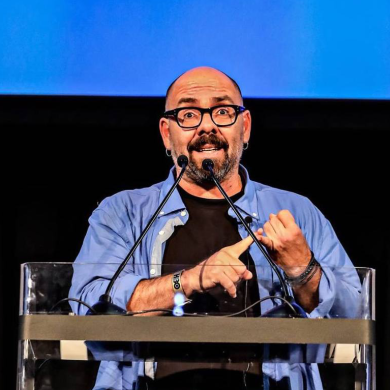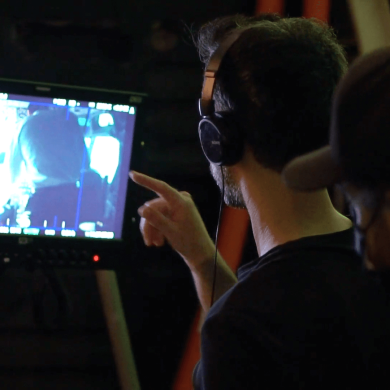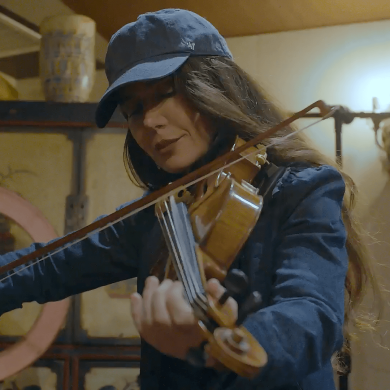Denise Huth is not a fan of horror.
And that’s surprising, considering that she produced the biggest sci-fi/horror series in television history, The Walking Dead. Moving to Los Angeles from Denver, Colorado with zero ties to the entertainment industry, she had no idea her journey would take her from working as a receptionist to becoming Executive Producer of The Walking Dead.
Eleven seasons later, Denise has said goodbye to the megahit series and is looking forward to her next adventure – hopefully with no zombies in her way.
She spoke with CreativeFuture about her background, her work with Frank Darabont, and her hectic yet gratifying time working on one of the most popular television series of all time.
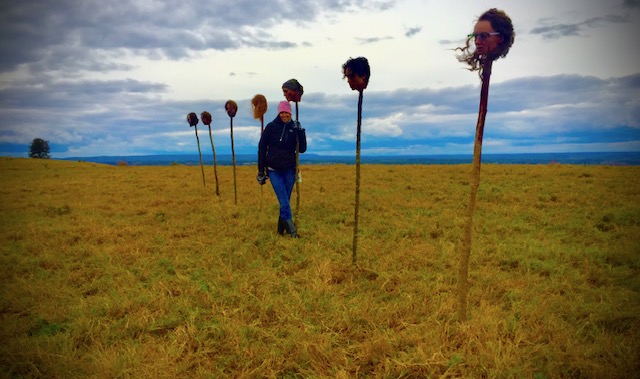
JC: Where did your interest in entertainment come from?
DH: The first movie that really had an impact on me was The Breakfast Club.
I remember it being one of the first movies that I talked about with my friends, with my mom, with my cousins – and everyone had a different take on it. We’d say, “Well, which character are you?” or “What did you think about this scene?” I remember thinking that it was so unbelievably cool – this group of people created this story, and we all get to watch it, and discuss it, and feel something from it.
There was also a desire to do something different than my family – my mom worked for the state of Colorado as an accountant, my uncle also worked for the state as an accountant – we used to call it the family business. I think there was an urge as a kid to go in the opposite direction.
Of course, at that time, I didn’t know what a producer was or what that job involved, but it was the world that I wanted to be a part of. That’s what led me to move out to LA, go to Pepperdine and pursue a career in entertainment.
JC: So you studied film at Pepperdine?
DH: They actually only had a television program at the time, so that’s what I was studying. In the early 90s, that program was a pretty small operation. It was great, though, because we were using cameras and learning how to edit from the very start during freshman year. Most of the time I was in classes with, like, eight other students. I really liked that small school environment. It was a blast.
JC: Tell me about your first job in the industry. What was it like going from the classroom to a professional environment?
DH: I was just excited to get to work.
My first job was as a receptionist at Scott Free, Ridley and Tony Scott’s company. And of course, I made no money, but that job started everything for me. It was amazing, and the people I met there are still some of my closest friends in the business to this day.
While I was working there, I actually did become an accountant, much to my own horror – but it was because I didn’t want to work in development. I wanted to work in production. It was valuable to my work as a producer because it allowed me to learn where the money goes, which is a huge part of the job.
JC: How did you start working with Frank Darabont?
DH: I had just taken a job at a small advertising agency that worked on movie advertisements and posters, and I was bored out of my mind.
One day, a very dear friend of mine, Julia Brothers, called me up. She was one of my first friends from working at Scott Free.
Julia was filling in at that time as Frank’s assistant because his assistant had just left, and she had to leave to take a role in a play, so she called me and recommended me for the job. And Frank hired me right away!
I loved working for him. It was like the coolest version of film school because he does everything – he’s a writer, he’s a director, he’s a producer. Getting to see projects go through the entire process from conception to release was amazing. He really valued my input and would ask for notes all the time, which helped me to build those skills.
JC: You didn’t feel intimidated to give Frank Darabont notes?
DH: A little bit!
I remember in the beginning, I thought he was just being nice, and he didn’t really care what I thought. But he did! He’s a very collaborative person.
Still, one of the best compliments I’ve ever gotten in my career was him telling me, “Your notes have always been hugely helpful.” But it was easy to give him notes because he’s such an amazing writer. I never had to say, “Well, this is just bad.” It was always simple things that I would point out to him.
JC: So, you came in right after Green Mile. What sort of projects were you working on while you were there?
DH: The next thing we did was The Majestic, and that was the first movie where I was working on-location, on-set every day. It was a great experience because I got to see it from start to finish.
Then, the first project I had a producer credit on was Stephen King’s The Mist. We had to make it on a tight schedule. We only shot for six weeks in Louisiana, but it was great. Most of it was shot handheld, with sort of a documentary look to it, and I think that’s what really makes the film work. It’s exactly what Frank set out to do.
JC: How did you and Frank come to be involved with The Walking Dead? Was he a fan of the comics?
DH: Yeah, Frank is a big comics guy.
While I was working for him, he called me up one day and said, “I’ve read the most amazing comic!” and proceeded to tell me everything about it. I could tell it was going to make for a great television show.
Once Frank had written the pilot, it ended up being kicked around for about five years. A lot of networks liked it, but they didn’t want to make it. At the time, no one was doing that kind of series on television, and people were nervous that this project would be very expensive. They thought this show would only appeal to hardcore horror and comic fans, and it wouldn’t have wide appeal. Which I get, because the great irony of my life is that I really don’t like scary movies.
But what people didn’t get is that it was never really about the zombies. It was always about the characters. It was a family drama at its core. Of course, I never thought in a million years that it would be as big of a hit as it became. Nobody did!
So after about four or five years, Gale Anne Hurd called. She loved the script and offered to help us out. It was her idea to take it to AMC, which at the time had Mad Men and Breaking Bad. These were unique and interesting shows that, like ours, most other networks would have never taken a chance on. And they took a shot on The Walking Dead hoping that it would find its unique niche and would bring in some viewers.
JC: Something that I think is interesting about the time period that The Walking Dead started in is that it coincided with the explosion of social media. People started turning to Twitter and Facebook to talk about culture, movies, and television. Do you feel that The Walking Dead benefited from that? Because I remember that I couldn’t get away from the show because so many people were talking about it on the internet.
DH: I think it was one of the last shows that was truly “appointment television” – you had to watch it when it aired, or it would be spoiled as soon as you went on the internet. That really helped the show’s success.
It was interesting working on it because we filmed the show in this little town in rural Georgia, and we were sort of in our own little bubble. It was like summer camp – we always filmed in the summer in Georgia, it was always hot as hell, we were always in the woods, and we could just work on telling our story without any input from the outside world.
So, when it came time to release the show, it was just insanity. Getting the ratings back, and seeing it explode in popularity after we had worked on it for so long, was a total surprise to us. We were making it for ourselves out in the woods, and then we turned it over to the fans and it took on a life of its own.
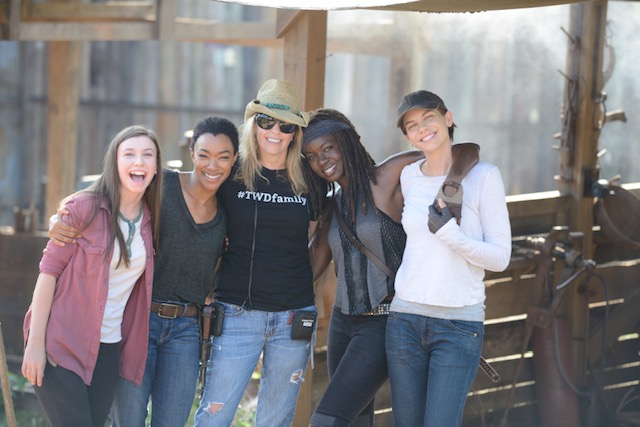
JC: While you were working on The Walking Dead, what were the different roles you had?
DH: Well, I didn’t know what my job was going to be when we started. I worked for Frank, and I was expecting us to just shoot the pilot in Georgia and then go back to LA to keep working on scripts and overseeing post-production.
But then, about a week before we finished the pilot, he said “I need you to stay here. I need you to be on the ground for me.” Suddenly, I was in Georgia for three-and-a-half months. I was on set every single day, and I became the person that everyone came to with their questions for the showrunner.
JC: There’s a big disconnect we find: When audiences don’t really understand what goes on behind the camera, and what people like you do. So, what were your days like during that time?
DH: I lived on set. I was there from crew call until wrap, almost every single day. For eleven years. And I’m very tired!
JC: That has to be like, what, ten hours a day?
DH: Oh no, in the early days, we’re talking about a minimum of twelve-hour days. And there were certainly days where we were going for thirteen, fourteen, fifteen hours.
There are a lot of things that happen in production – the weather doesn’t cooperate, the equipment breaks, an actor gets sick… As a producer, it’s my job to keep things up and running.
There was also a lot of working with actors. If they had questions about what a certain moment means for their character, or where this plot point fits into the overall story, then I would be the person to answer their questions since I usually knew what the showrunner wanted.
I was the on-set creative producer, which not every show has. For us, the showrunner was here in LA, and we needed someone on the ground in Georgia, and that was me. It was exhausting, and difficult in so many ways… but it was the best. I loved it.
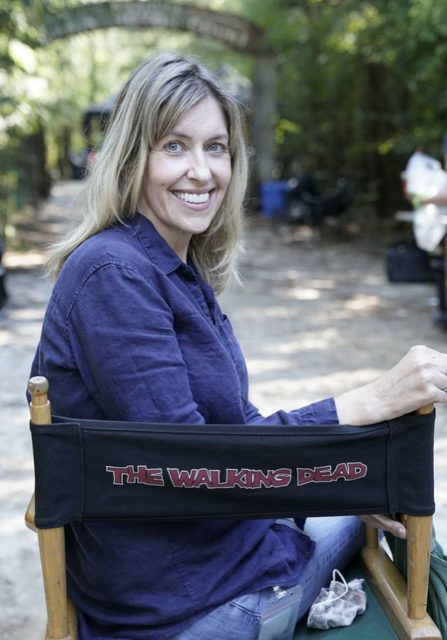
JC: What was the end of the show like for you?
DH: It was tough! We filmed the final season for a year-and-a-half straight. So, by the time it ended, I was just exhausted, and everyone involved was as well. If anyone ever suggests that you do thirty episodes in one season, just say no!
It was bittersweet for sure. As difficult as it was, I was grateful for the experience. But I was ready for it to be over. After all that time working together, we had become a family, so it was hard to say goodbye, and I still miss all the people I worked with who don’t live out in LA.
JC: So, what’s next for you? Are there more zombies in your future?
DH: My big wish is that the next thing I work on is something really different. I love The Walking Dead so much, but I’m still not a horror girl, and to work on a show where I didn’t have to say “More blood!” would be really exciting to me.
The Walking Dead was special, it had one of the best pilots ever, and it just connected with audiences in an unbelievable way. And it hit the world at the right time, so I don’t hope to replicate that success.
But I do hope I can find another show with characters you love and want to learn more about. The biggest lesson I learned from this show is that genre doesn’t matter. As long as the story is good, it doesn’t matter what world it’s in.

